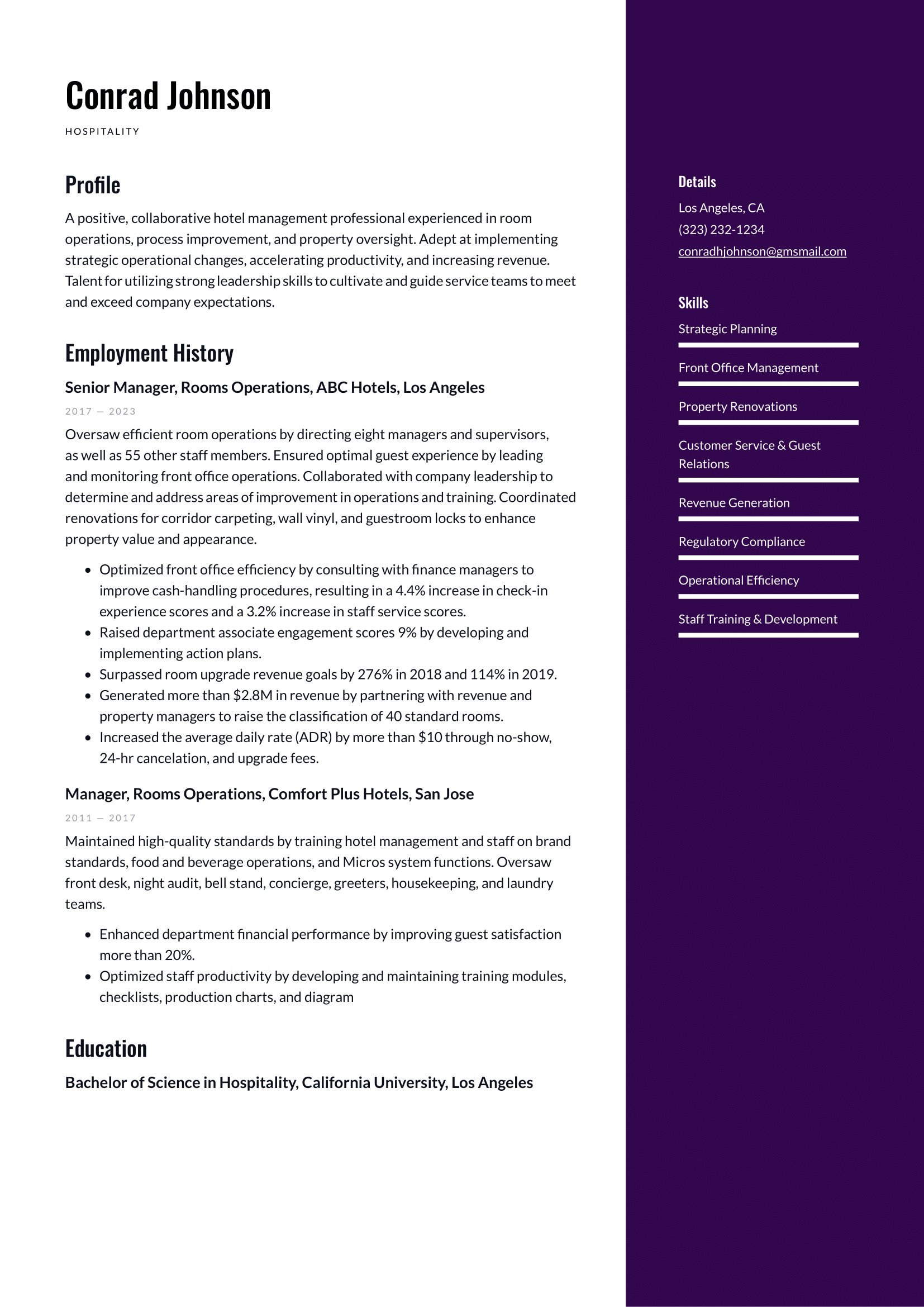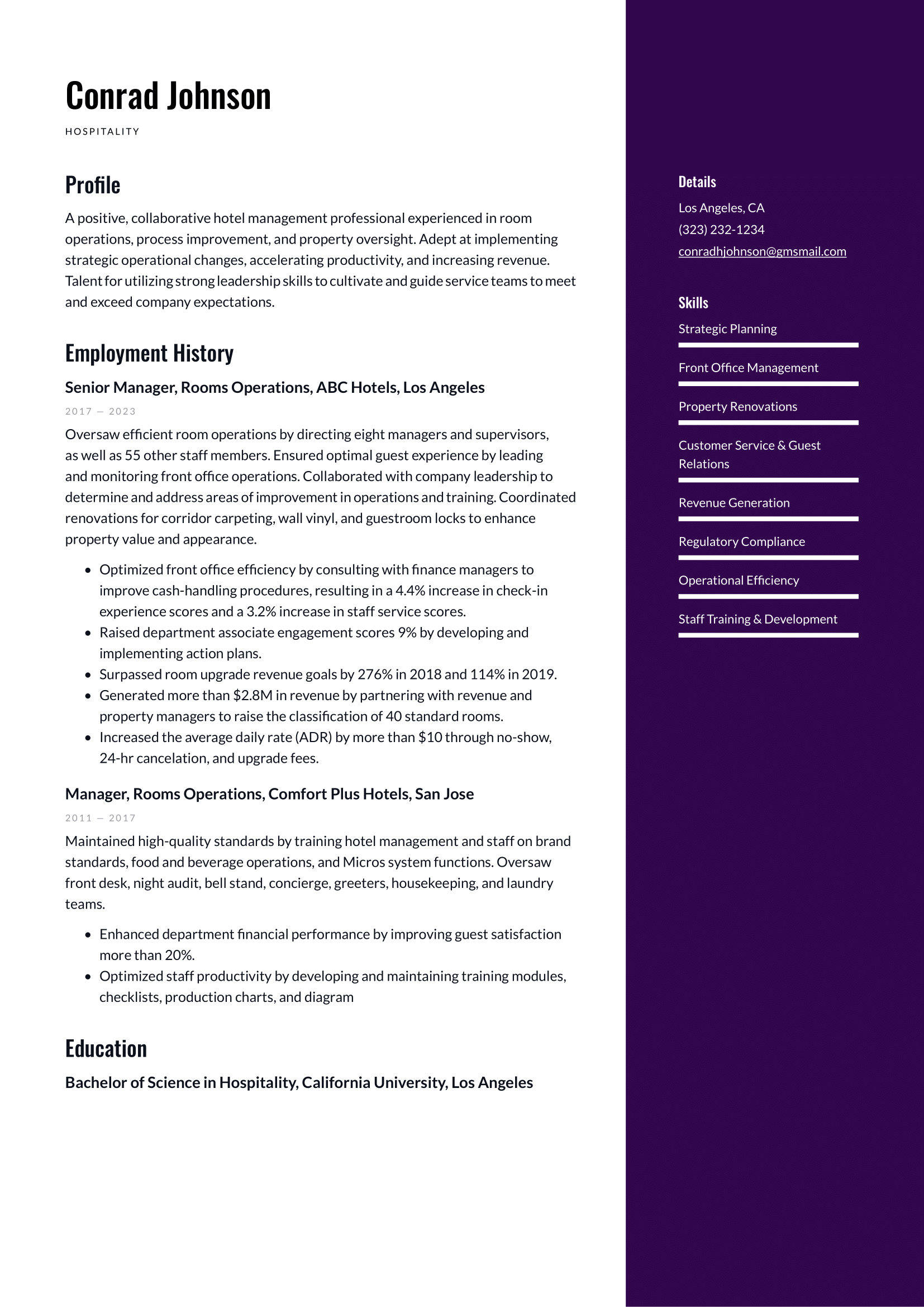- Why use this hospitality resume example?
- How to write a great hospitality resume
- Which key skills are relevant for a hospitality resume?
If you’re in the hospitality business, then you know it can be very competitive. It’s a huge industry with many different and well-paying jobs, but there are also a lot of people going for those positions. Your resume can make the difference between being considered for the job or not. Check out our great example of a hospitality resume to get some ideas on how to make your resume stand out. Hospitality professionals are employed in a wide array of businesses and roles. These can include hotels, bars, cafés, restaurants, airlines, theme parks, cruise ships, resorts, and tourist attractions. Hospitality is the business of making people feel welcome, assisting them, and making sure that they have the best time possible. It takes a lot of different abilities to be an outstanding hospitality professional, read on to find out how to write a resume that best shows your skills.
Why use this hospitality resume example?
Our hospitality resume is a solid example of a resume for someone that has experience in the industry. When you’re going for a higher-level hospitality role, then you need to have experience and some great skills. The best way to get your resume noticed is to have an eye-catching summary statement.
Take a look at the summary in the sample. Notice how concisely and dynamically it highlights the applicant's skills, experience, and personality. Your summary needs to be short, a few sentences at most, because space is limited. You will need all the space you can get for the rest of your resume. Notice, also, how the sample summary utilizes keywords - like collaborative, room operations, and strategic operational changes - to demonstrate the applicant’s successes and abilities. Study the job description, and use the skills and keywords you find that are in your repertoire. Also, include a couple of your best accomplishments that show off your talents. Think about what would most impress your potential boss and use those examples.
Each section of your resume needs to be clear and concise. This especially goes for your professional experience section. Don’t use extensive descriptions and avoid using a lot of adjectives. Keep each description short and focused on your positive accomplishments. You don’t need to list basic tasks and responsibilities, include only the things you did that make you stand out. See how well the sample makes use of quantifiable metrics to show the tangible impact the applicant had on previous roles. Measurable results demonstrate to potential employers what you could possibly achieve for their company.
The best resumes provide employers with an overall portrait of you as an individual, and it doesn’t just supply experiences and abilities but gives an idea of who you are and how you can contribute to the organization. This example hospitality resume shows how to bring together the different elements and combine them into a cohesive document. You can use this format and structure to create your own great hospitality resume.
How to write a great hospitality resume
We’ve already talked about how your resume sections need to be short and to the point. You also need to make each section of your hospitality resume contribute to painting the picture of how great a hospitality professional you are.
The big challenge with writing a good resume is to effectively tie together the different sections of the resume into a single view that holds the hiring manager’s attention. If your resume is difficult to understand or doesn’t have everything the employer needs to know, then they’ll either not read it all or throw it away. Having a resume that includes all the relevant information in easy-to-read sections is the best way to make your potential new employer take the time to read your entire resume.
Here are the sections you should have with the basic approach for each:
Resume summary. Write a few sentences that run down your best traits, experiences, and knowledge related to the position you are applying for. Be creative and make it memorable.
Core competencies. List out all your best skills that are relevant to the job. Include both hard skills (tech, specific expertise) and soft skills (customer service, people skills).
Professional experience. List your work experiences in reverse chronological order. Keep the descriptions brief and focus on the most important or relevant parts of each job. Include achievements, accomplishments, and recognitions received.
Education. Include your most recent schooling, degrees training, licenses, and certifications.
Just listing out your skills and having the right keywords will not be enough to land your next great hospitality job. You need to include things that show you are the best candidate. For example, putting “Leadership” in the skills section will not mean anything. You have to back it up by giving an example of how you used your leadership abilities to benefit the business. Something like “Led a project team to build a new product that increased revenues by 15%.” This example uses the keyword and hard numbers to demonstrate your skill through an achievement.
Which key skills are relevant for a hospitality resume?
It takes a lot of different skills to be a great hospitality pro. Some of the most important abilities are people skills, independence, and initiative. You have to anticipate customer needs, resolve problems, and provide great customer service. Job duties may vary, so your hospitality resume has to prove you are industrious and can work independently to handle customers effectively.
Some great skills for a hospitality professional to put on your resume include:
Adaptability
Attention to detail
Communication
Customer service
Industry knowledge
Problem-solving
Professionalism
Teamwork
Summary example
A positive, collaborative hotel management professional experienced in room operations, process improvement, and property oversight. Adept at implementing strategic operational changes, accelerating productivity, and increasing revenue. Talent for utilizing strong leadership skills to cultivate and guide service teams to meet and exceed company expectations.
Employment history example
Senior Manager, Rooms Operations at ABC Hotels, Los Angeles
2017 - Present
Oversaw efficient room operations by directing eight managers and supervisors, as well as 55 other staff members. Ensured optimal guest experience by leading and monitoring front office operations. Collaborated with company leadership to determine and address areas of improvement in operations and training. Coordinated renovations for corridor carpeting, wall vinyl, and guestroom locks to enhance property value and appearance.
Optimized front office efficiency by consulting with finance managers to improve cash-handling procedures, resulting in a 4.4% increase in check-in experience scores and a 3.2% increase in staff service scores.
Raised department associate engagement scores 9% by developing and implementing action plans.
Surpassed room upgrade revenue goals by 276% in 2018 and 114% in 2019.
Generated more than $2.8M in revenue by partnering with revenue and property managers to raise the classification of 40 standard rooms.
Increased the average daily rate (ADR) by more than $10 through no-show, 24-hr cancelation, and upgrade fees.
Manager, Rooms Operations at Comfort Plus Hotels, San Jose
2011 - 2017
Maintained high-quality standards by training hotel management and staff on brand standards, food and beverage operations, and Micros system functions. Oversaw front desk, night audit, bell stand, concierge, greeters, housekeeping, and laundry teams.
Enhanced department financial performance by improving guest satisfaction more than 20%.
Optimized staff productivity by developing and maintaining training modules, checklists, production charts, and diagram
Education example
Bachelor of Science in Hospitality at California University
Skills example
Strategic Planning
Front Office Management
Property Renovations
Customer Service & Guest Relations
Revenue Generation
Regulatory Compliance
Operational Efficiency
Staff Training & Development


